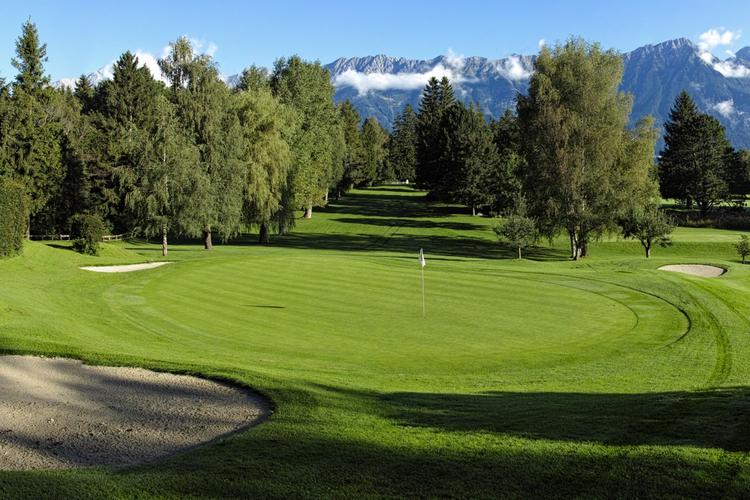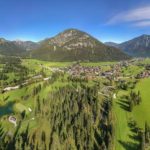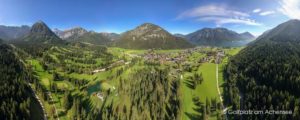
Wir trafen Ladies European Tour-Proette Christine Wolf auf eine Runde Golf im malerisch gelegenen Golfclub Innsbruck-Igls Lans und sprach mit der bodenständigen Tirolerin über die Vorzüge der Heimat, ihren größten Triumph und das Leben als Profi-Golferin im Lockdown.
Normalerweise jettest du als Profi-Golferin rund um die Welt. In den vergangenen Monaten war das während der Corona-Zwangspause nicht möglich. Hast du es genossen, einmal nicht aus dem Koffer leben zu müssen, oder hat dir der normale Tour-Alltag sofort gefehlt?
Ich genieße es, unterwegs zu sein und Turniere auf der ganzen Welt zu spielen. Sicherlich war es ungewohnt, länger als eine Woche zuhause zu sein, bevor ich wieder für vier bis fünf Wochen auf Reisen bin. Dennoch empfand ich die Zeit, die ich jetzt zuhause zusammen mit meinem Freund und meiner Familie verbrachte, als sehr schön. Sportlich kam die Zwangspause für mich nicht ganz ungelegen. Der Saisonstart verlief nicht wie gewünscht, und so war die Pause gut, um herunterzukommen. Unsere Off-Season ist ohnehin immer recht kurz bemessen. Ich habe zuhause im Garten Abschlag-Netze und Putting-Matten aufgebaut und intensiv an meiner Technik gefeilt. Bevor am 1. Mai die Golfplätze für Alle wieder geöffnet hatte, durften wir Professionals ab Mitte April auf den Golfplatz, um zu trainieren. Im Juni habe ich dann Turniere in Österreich gespielt und durchwegs gute Ergebnisse erzielt. Nun freue ich mich auf die ASI Ladies Scottish Open und damit den Start der LET-Saison.
Sportler leben vom und für den Wettkampf. Wie hält man die Trainings-Motivation hoch, wenn man nicht weiß, wann das nächste Turnier stattfinden wird?
Die Situation war echt komisch. Lange wusste niemand, wann und wie es weitergehen wird. Mehrmals hieß es, dass es zu einem gewissen Zeitpunkt soweit wäre. Also habe ich begonnen, mich vorzubereiten. Letztendlich wurden aber alle Turniere abgesagt. Da war es dann tatsächlich schwierig, sich immer wieder neu zu fokussieren. Schließlich will man am Tag des Turniers den Leistungs-Höhepunkt erreichen.
Wir sitzen auf der Terrasse des Golfclubs Innsbruck-Igls Lans, haben 9 wunderschöne Löcher hinter uns. Was macht für dich Heimat aus?
Man muss nur rundum blicken: Die Berge sind mein Kraftplatz. Wann immer ich Pause vom Golfsport mache, bin ich auf einem Berg in der Nähe meiner Heimatgemeinde Igls unterwegs. Am Gipfel überwältigt nicht nur der Ausblick, sondern man fühlt sich einfach frei. Auf Berge zu wandern kann ich richtig genießen. Gemeinsam mit meinem Freund und einem befreundeten Pärchen haben wir erst vor Kurzem eine vier-Tages-Tour durch das Karwendel Gebirge unternommen. Handy-Empfang hatten wir nur auf den Gipfeln. Ein wunderbares Erlebnis.
Hier hat vor knapp 20 Jahren auch deine Golf-Karriere begonnen. Ab wann war für dich klar: du möchtest als Profi-Golferin deinen Lebensunterhalt bestreiten?
Im Hinterkopf hatte ich es bereits früh. Als ich dann mit 18 nach US-Amerika ging, konnte ich mich nochmals besser mit Anderen messen. Als ich mich noch als Amateurin für die US Open qualifizierte, war ich mir zu 100 Prozent sicher: Das will ich wirklich machen.
Wie hat dich deine Zeit am US-College geprägt?
Für mich war das eine ganz andere Welt. Dort drüben ist alles so professionell aufgebaut, das ganze System fußt auf jahrzehntelanger Erfahrung. Uns Athleten standen an der Universität ein eigenes Fitnesscenter, ein Fitnesstrainer nur für uns Golfspieler und eigene Physiotherapeuten zur Verfügung. Alles wurde perfekt auf den Sport abgestimmt. Wir lebten direkt am Campus, und wenn es ein Problem gab, hatten wir immer jemanden, der sich darum kümmerte. Selbst, wenn wir an freien Tagen ein zusätzliches Fitness-Training einlegen wollten, hatte unser Trainer Zeit, um spezifisch mit jedem Einzelnen zu arbeiten. Meine Zeit am College hat mir gewissermaßen die Augen geöffnet und ich habe verstanden: Aha, so macht man das. Das alles kannte ich vorher nicht.
Wie kommt man als junges österreichisches Golf-Talent eigentlich an ein Golf-Stipendium für ein US-College? Hast du dich selbst beworben, oder wurden Scouts auf dich aufmerksam?
Als ich in Schottland ein Nachwuchsturnier spielte, kam ein Vertreter der University of Tennessee at Chattanooga direkt auf mich zu und lud mich für den kommenden November ein, mir alles anzusehen, da sie mich gerne ins Golf-Team einladen wollten. So hat alles angefangen.
Die Professionalität, die du am College kennengelernt hast, wirkt bis heute nach. Du hast sechs Betreuer im Team: Golftrainer, Fitness-Coach, Pilates, Physiotherapeut, Osteopath und Mentaltrainer. Wer ist der Wichtigste?
Schwer zu sagen, ob einer der wichtigste ist. Sie müssen vielmehr zusammenspielen und sind gemeinsam extrem wichtig für mich. Den häufigsten Kontakt habe ich sicherlich mit meinem Golf-Coach Steve Waltman, denn mit ihm koordiniere ich auch das Fitness-Programm. Die Fitness-Trainer treffe ich, wenn ich zuhause bin, dafür fast jeden Tag. Steve treffe ich im Golfclub Kitzbüheler Alpen Westendorf, wenn ich in Tirol bin, einmal pro Woche.
Im Profisport geht es um Fleiß und Talent, aber auch um das richtige Mindset. Was ist entscheidender?
Sicherlich braucht es anfangs Talent, denn ohne Talent geht gar nichts. Doch gleich danach muss man vor allem hart für den Erfolg arbeiten. Es wird einem nichts geschenkt. Spätestens im Profisport muss man auch das nötige Mindset mitbringen. Plötzlich geht es nicht nur um den Sieg, sondern auch um Geld und offene Rechnungen, die beglichen werden müssen. Wenn man die ersten Male vorne mitspielt, ist das mental eine echte Herausforderung. Es geht aber auch darum, zu beweisen, dass man auch als Profi gewinnen kann. An diesen besonderen Druck muss man sich gewöhnen. Ich bin nun aber bereits seit acht Jahren Profi und kenne den Ablauf und die Menschen auf der Tour. Das hilft.
In welchen Situationen sprichst du mit Deinem Mentalcoach?
Wir treffen uns nicht regelmäßig. Stattdessen sprechen wir situationsbezogen. Wir sprechen dann etwa darüber, wie man damit umgeht, wenn man nach drei Tagen um den Titel mitspielt. Wie schaffe ich es, nicht zu weit nach vorne zu denken, sondern im Moment zu bleiben? Wir sprechen aber auch über Momente, in denen es nicht so gut gelaufen ist. Dann wollen wir herausfinden: War es der Kopf, oder war mein Spiel schlecht? Jeder Golfer weiß, dass es in unserem Sport ein ewiges Bergauf und Bergab gibt. Es wird niemals einfacher, zu akzeptieren, dass es nicht immer gut laufen kann. Aber man lernt, besser damit umzugehen.
2016 hast du Österreich bei den Olympischen Spielen in Rio vertreten. Denkst du, wir werden 2021 olympische Spiele erleben?
Morgen wäre ich eigentlich nach Japan geflogen. Die Austragung 2021 muss sicherlich noch einige Probleme überwinden. So wurde etwa das olympische Dorf bereits verkauft, die Wohnungen werden nach dem ursprünglichen Termin der Olympiade 2020 bereits von dauerhaften Bewohnern bezogen. Letztendlich ist es schwer zu sagen und hängt von der globalen Corona-Situation ab. Solange die Spiele nicht abgesagt sind, werde ich mich aber darauf vorbereiten.
2019 dann dein erster Sieg auf der LET bei den Hero Women’s Indian Open. Was war damals ausschlaggebend?
Ich war immens fokussiert und im Flow, nachdem ich auf demselben Platz im Vorjahr den Sieg nach vier Tagen am letzten Loch aus der Hand gab. Als ich 2018 von Indien wegflog, freute ich mich bereits auf die Rückkehr 2019. Vor dem letzten Spieltag kam ich früher an den Golfplatz und saß zehn Minuten auf der Terrasse des Clubhauses, von welcher aus man das 18 Loch gut einsehen kann. Ich ging in mich und freute mich richtig auf die bevorstehende vierte Runde. 18 Löcher war ich dann extrem fokussiert und kaum nervös, sondern innerlich ruhig und im Flow. Ich konnte mein Spiel durchziehen und gewinnen.
Interessant ist deine Einstellung: Man könnte auch mit dem vergebenen Sieg vom Vorjahr hadern. Du bist stattdessen mit Freude und einer positiven Grundeinstellung nach Indien zurückgekehrt und hast triumphiert.
Das Feedback vieler andere Spielerinnen im Vorjahr trug sicherlich dazu bei. Sie kamen damals direkt nach dem vergeigten 18. Loch zu mir und sprachen mir Mut zu. Sie bestätigten mir, dass ich fast vier komplette Tage dominiert hatte. Lediglich ein Loch war ausschlaggebend. Klar, ich hatte damit auch zu kämpfen. Aber insgesamt überwog das Positive. Und ich kehrte 2019 top vorbereitet nach Indien zurück. Nach dem Sieg freuten sich viele ehrlich mit mir.
Für den Sieg in Indien gab es knapp 60.000 Euro Preisgeld. Männer verdienen in der Liga, in der auch du spielst, deutlich mehr. Was sagst du dazu?
Wir verdienen in etwa zehn Prozent von dem, was die Herren auf der Tour verdienen. Der Unterschied ist einfach enorm. Wir Damen haben aber denselben Aufwand, leisten dieselbe Arbeit und müssen für dieselben Kosten aufkommen. Flüge, Hotels, Trainer und Therapeuten kosten über das Jahr hinweg eine Menge Geld.
Was müsste sich konkret ändern, um den Pay Gap zu schließen?
Wir brauchen mehr Fernsehzeit und Präsenz in den Medien. Nach den Turnieren in der Corona-Zeit, die medial gut verbreitet wurden, bekam ich total gutes Feedback. Speziell die Golf4Corona-Charity brachte Sarah [Schober, Anm.] und mich medial ins Rampenlicht. Das ist ungewohnt. Es war schön zu beobachten, dass die Menschen auf uns zukamen und viel öfter als einmal sagten: Wow, ihr spielt genauso gut wie die Herren, und wir freuen uns, euch im Fernsehen dabei zuzusehen.
Wer kann helfen?
Fernsehübertragungen kosten eine Menge Geld, oft fehlen die Sponsoren. In der Vergangenheit spielten wir bereits Events gemeinsam mit den Herren der European Tour. So waren auch wir Damen im Fernsehen zu sehen und konnten für unseren Sport werben. Es wäre super, wenn uns die Herren-Tour helfen könnte und es noch mehr solcher Events für Damen und Herren gäbe. Eine andere Möglichkeit wäre, die Damenturniere am Ort der Herrenturniere von Montag bis Mittwoch auszutragen. Das wurde bereits einmal in der Türkei getestet und wurde total gut angenommen – auch, weil an diesen Tagen ansonsten kein Live-Golf im Fernsehen übertrag wird. Uns Damen wäre es egal, ob wir am Beginn oder Ende der Woche spielen. Von sieben Tagen Live-Golf im Fernsehen würde aber alle profitieren. Wieso der Test nicht fortgesetzt wurde, wissen wir Spielerinnen leider nicht.
Zuletzt hast du in Zell am See die Österreichische Meisterschaft bestritten. Was macht das Golfspiel in Salzburg und Tirol so außergewöhnlich?
In Tirol die Berge, in Salzburg die wunderschönen Seen. Da wie dort ist das Panorama einfach der Hammer. Jeder, der mich besuchen kommt, egal von wo auf der Welt, sagt: Wow! Alle sind von der Landschaft, die unsere Heimat bietet, beeindruckt. Auch, was die Pflege, den Zustand und das Rundherum betrifft, können wir im weltweiten Vergleich mithalten. Es ist kein Zufall, dass die European Tour der Herren mit zwei Turnieren in Österreich in die neue Saison startete. Konkret erinnere ich mich an österreichische Matchplay-Meisterschaften am Golfplatz Innsbruck-Igls Rinn, wo sich der Platz in einmaligem Zustand befand und international gelobt wurde. Die heimischen Greenkeeper leisten großartige Arbeit.
Du bist auf den schönsten Golfplätzen der Welt unterwegs. Hand aufs Herz: Welcher ist dein Lieblingsplatz – weltweit und in der Golf-Alpin-Region?
International gefallen mir der Emirates Golf Club in Dubai und der DLF Golf & Country Club in Gurgaon, Indien, besonders gut. Aber auch der Renaissance Club in Aberdeen, Schottland, wo wir am 13. August in die Saison starten. Ein Links-Course, ganz anders, aber wunderschön.
Es gibt so viele beeindruckende Golfplätze in Tirol, etwa der Golfclub Kitzbüheler Alpen Westendorf, den Golfclub Mieming oder die beiden 9-Loch-Plätze Kaps und natürlich mein Heimatplatz Olympia Golf Igls mit Blick auf die Nordkette. Zu meinen absoluten Lieblingsplätzen daheim zählen sicherlich die Leading Golf Courses Golfclub Achensee in Pertisau und der Golfplatz Zillertal-Uderns.
Vielen Dank für das sympathische Gespräch & die gemeinsame Golfrunde am aussichtsreichen Golfplatz Innsbruck-Igls Lans!
Fotos: Tristan Jones, Martin Angerer, GC Innsbruck Igls-Lans, Text: Martin Angerer













